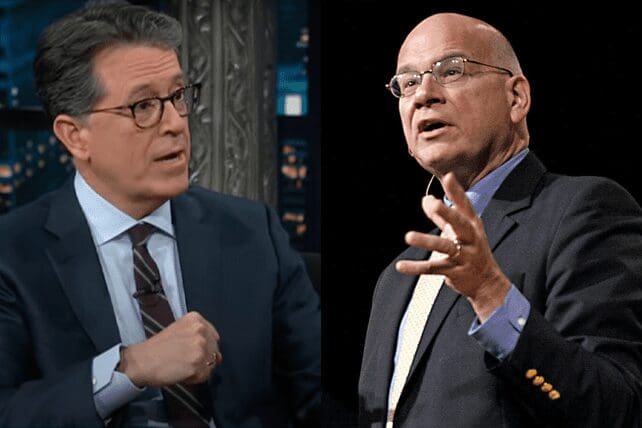Others called Colbert’s faith into question not on the grounds of his political affiliation but for the fact that he is not Protestant.
“Precisely what faith did he articulate? What I didn’t hear was anything remotely associated with authentic Christianity,” said church planter and podcaster Nathaniel Jolly in response to Bradley’s commendation of Colbert’s words. “(Also, Catholicism is an enemy to Christ).”
“Serious Question Mr. Keller, do you believe Catholicism is a legitimate form of Christianity,” Jolly replied to Keller, later tweeting in a separate thread, “Catholicism is NOT Christian. The Catholic church anathematizes anyone who believes in salvation by faith alone, which is in direct opposition to the teachings of Scripture. Stop promoting a Satanic system leading people to hell.”
RELATED: Anti-CRT Atheist Author Tells Timothy Keller to ‘Repent’
In light of the discussion that ensued from his remarks about the clip, Keller said, “Comments from the original tweet remind me that there are habits on Twitter we should reject: 1) If you cite person X at all you must answer for everything person X ever did or said. 2) I can attribute opinions to you that you would not own.”
“Note: when you quote a person as an example in a particular moment, it doesn’t mean you have to answer for that entire person’s life for that quote to be valid. It’s almost like those who do so don’t want to deal with the material at hand,” Keller later reiterated.
Keller also expounded upon why he thought Colbert’s remarks were a “brilliant example of how to be a Christian in the public square” in a later thread, which focused on the idea of contextualization.
“The recent post I made about Stephen Colbert’s partial answer about his faith and the ensuing comments has shown me American Christians still have a long way to go on understanding Col 4:5-6, how to be ‘wise in the ways you act towards outsiders?’ This is called contextualization,” Keller said. “What is contextualization? It’s adapting your message to be understandable and compelling to particular hearers without compromising the truth in any way.”
“Why contextualize? First, because everyone already does it. As soon as you choose a language to speak in, and vocabulary and illustrations, and arguments, you are adapting to some human hearers more than others. If you don’t become conscious of how you are contextualizing—which is inevitable—you won’t contextualize well,” Keller continued. “Second, because Paul contextualizes in his speeches.”
“Third, because the Biblical writers contextualized,” Keller said, citing examples from the Gospel of John, Deuteronomy, and 1 Corinthians. “Fourth, because Paul calls us to contextualization without compromise in 1 Cor 9:19-23.”
RELATED: When Your Wound Is the Gift: Stephen Colbert and Anderson Cooper Discuss Grief

